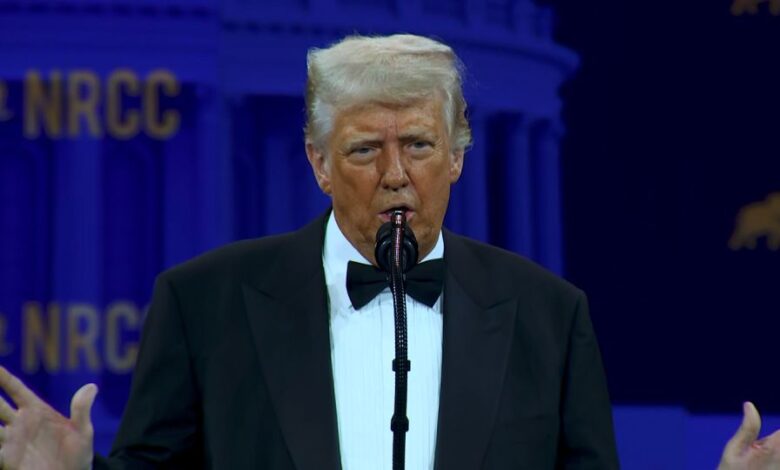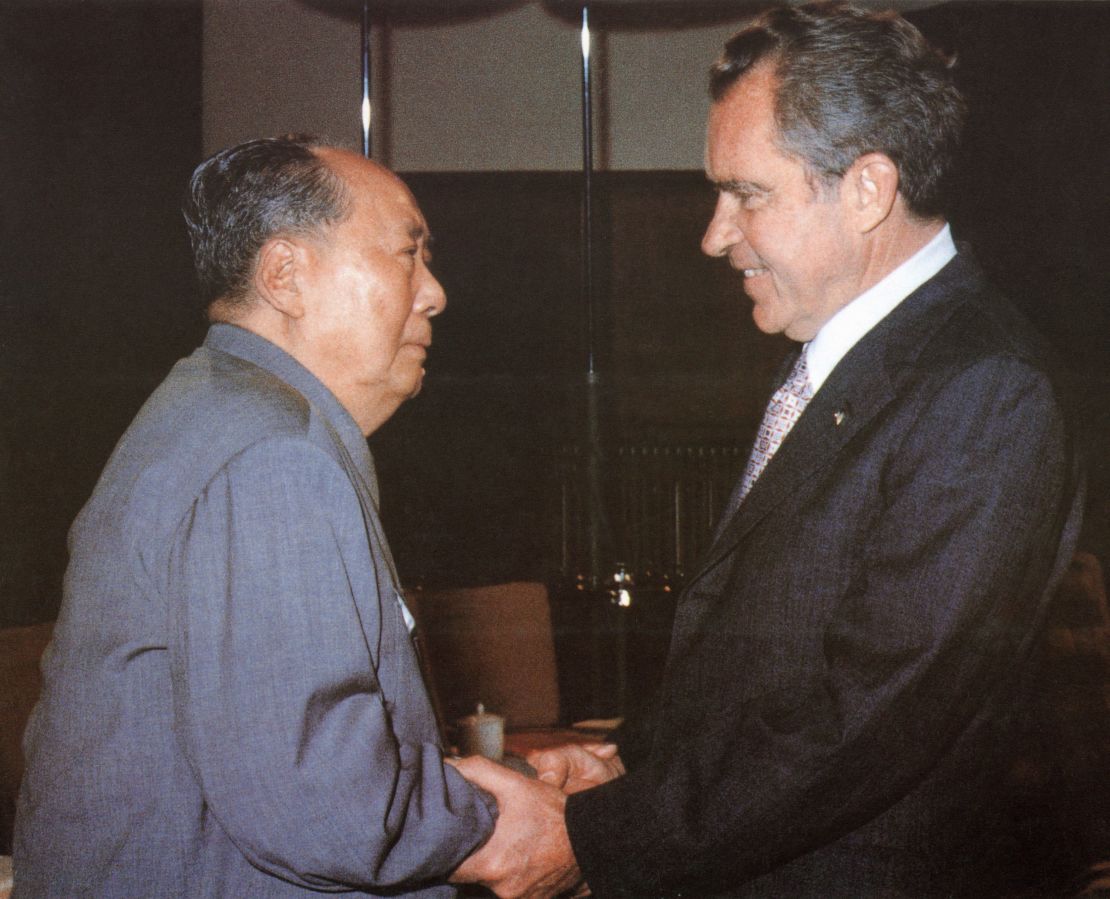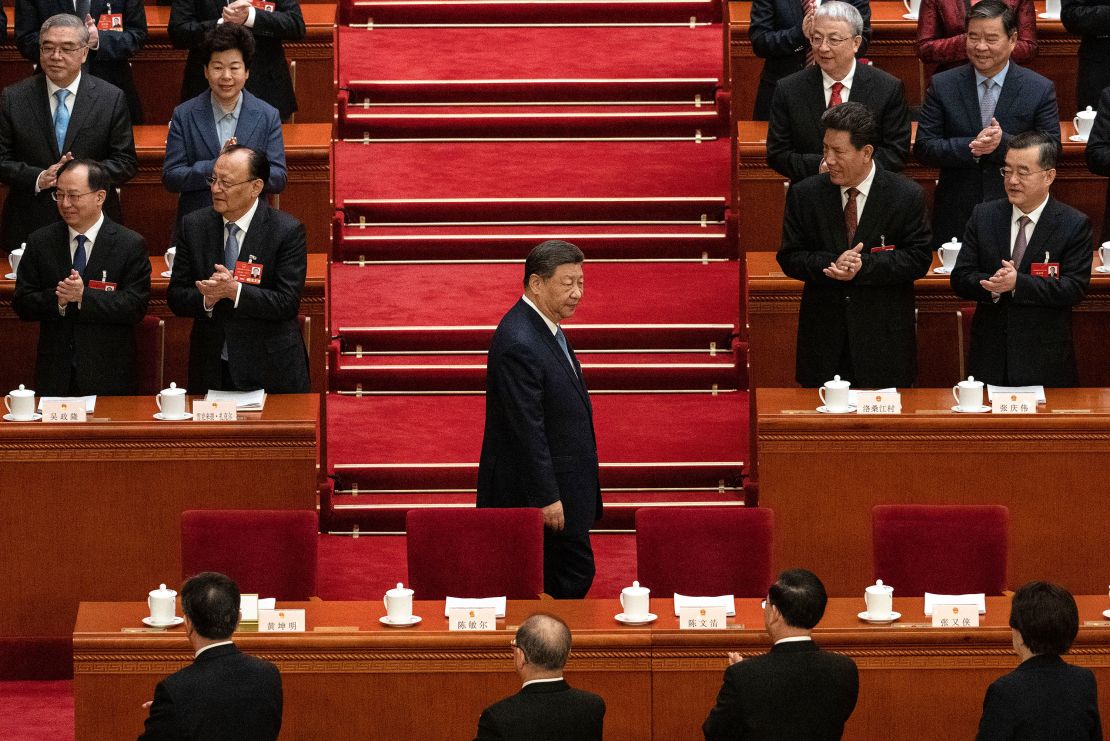
President Donald Trump just ignited a direct showdown with the one nation that might be able to beat the United States in a trade war.
Trump’s escalation against China — which is about to face tariffs of at least 104 percent on goods entering the US — is the most serious pivot yet in his global tariff onslaught and has the most potential to inflict severe blowback on American citizens in soaring prices.
The confrontation follows years of US attempts to address perceived trade abuses by China. It’s also the culmination of a decade or more of worsening relations prompted by an aggressive and nationalistic shift by a Pacific competitor turned hostile superpower that now seems itching to challenge US might.
And it’s a dark landmark in a diplomatic relationship that will help define the 21st century and a breakdown for a long US project to prevent tensions erupting into a full-on trade war — or potentially much worse — between two giants.
The US has been trying to manage China’s emergence for more than 50 years — since President Richard Nixon’s pioneering visit to Chairman Mao Zedong to “open” an isolated and impoverished nation and to drive a wedge between its leaders and their communist brethren in the Soviet Union. It’s been nearly a quarter-century since another milestone: when the US ushered China into the World Trade Organization in hopes of promoting democratic change and locking it into a rules-based, Western-oriented economic system.
The ultimate failure of those well-intentioned efforts is being laid bare in Trump’s second term. The president rose to power on a populist wave that was partly a reaction to globalization that exported US industrial jobs to China and left blight in its wake.

Prospects for a deal with China seem grim
Trump claims that scores of nations are eager to make trade deals to defray painful US tariffs.
But China isn’t joining their ranks.
Beijing rebuffed Trump’s warning not to retaliate against an earlier 34 percent tariff on top of a first round of duties — warning that it was ready to fight to “the end.” The US leader, caught up in a fast-spiraling clash with President Xi Jinping, then had to preserve his credibility by making good on his threat to impose a gargantuan import tax from goods from the world’s second-largest economy on Wednesday.
“Countries like China who have chosen to retaliate and try to double down on their mistreatment of American workers are making a mistake,” White House press secretary Karoline Leavitt said Tuesday. “President Trump has a spine of steel, and he will not break, and America will not break under his leadership.”
The vast stock of personal and political capital Trump has now invested in the faceoff with Xi makes this the most serious lurch of a volatile week since the US president announced his “Liberation Day” tariffs in the White House Rose Garden.
China is showing every sign that it thinks it can outlast Trump in their clash, for which it has been preparing for years. And it’s not clear Trump and his top officials are fully prepared for the extent of China’s resilience or the pain it can impose on American consumers.
If the US president assumed that what he almost daily hails as his “great relationship” with Xi would yield a quick Chinese climbdown, he’s wrong. The prospect of a trade agreement with Beijing similar to the one in the first Trump term, which largely fell apart during the pandemic, seems distant.

Tensions are peaking over trade with hubris on both sides
Trump’s claims that the US has been “raped” and “pillaged” by trade partners are hyperbolic. But his grievances about Beijing’s behavior have been shared by multiple presidents. Tensions often flare over import dumping, market access for US firms, intellectual property theft, currency manipulation and industrial espionage. Previous White Houses pursued targeted enforcement and other penalties to try to reshape China’s behavior. Years of acrimony in the relationship have fueled the shared bipartisan doctrine in Washington that Beijing is the preeminent military and economic threat to US power.
But Trump’s aggression is unparalleled. He believes he has a unique and perhaps final opportunity to transform the US dynamic with what the US Trade Representative’s office describes as the world’s largest trading nation. “We have one shot at this,” Trump told reporters in the Oval Office on Monday.
But his method is impulsive and indiscriminate; it lacks a clear strategy.
It also shows little respect for Chinese dignity and power — a recurring theme in the administration’s dealings with other countries.
Vice President JD Vance, for instance, last week mocked China in criticizing past US trading policy. “We borrow money from Chinese peasants to buy the things those Chinese peasants manufacture,” he said. “That is not a recipe for economic prosperity. It’s not a recipe for low prices, and it’s not a recipe for good jobs in the United States of America,” Vance told “Fox & Friends.”
The vice president’s contemptuous remarks ignored the transformation in China’s economy. It is now a global leader in innovation on artificial intelligence, electric vehicles, energy production and in many other areas. Beijing on Tuesday condemned Vance’s words as “astonishing,” “lamentable,” “ignorant” and “disrespectful.”
There are high-stakes political, global, economic reasons why Xi can’t bend.
The ruthless Chinese leader presents himself as a historic catalyst of Chinese civilization’s rightful return to power and prestige. A capitulation to a tough-talking American president would therefore be unthinkable. Showing weakness to the United States would also undercut China’s own power and would be seen as a loss of face — especially within Asia.
China’s rhetoric, meanwhile, is peppered with assumptions that the US is trying to devastate its economy and political system. Liu Pengyu, spokesman for China’s embassy in Washington, for instance, condemned US tariffs on Tuesday as “abuse” and as an infringement of China’s “legitimate rights.”
In Beijing, as in Washington, hubris is stoking the antagonism.
China’s official media bristles with certainty that America is an empire in decline. Far from being a show of strength, Trump’s second presidency and the political chaos he incites are seen as symptoms of weakness.
Trump’s histrionics and attacks on US allies, including in Southeast Asia, also play into China’s argument that the United States is not a reliable partner, and that China’s brand of capitalism twinned with political control is a better model.
China’s confidence ahead of what could be a dragged-out trade battle with the United States is also rooted in Xi’s reorientation and modernizing of the Chinese economy.
“I think if you are Xi Jinping right now, you’re thinking, ‘Well, hey, on the metrics that I care about — technological resilience and self-reliance, we are doing ok, these tariffs may not immediately impact us,” said Lily McElwee, adjunct fellow at the Center for Strategic and International Studies. Xi may also believe that beyond China’s core strength, it has “retaliatory tools that (it) can impose that will be costly to the United States as well,” said McElwee, who is also president and CEO of the Phoenix Committee on Foreign Relations.
As a real authoritarian leader, Xi, unlike Trump, has no worries about the impact of a trade war on looming elections — such as the congressional midterms next year. And while public opinion is still important in China, Xi may reason he can afford to inflict more pain on the Chinese than Trump can on Americans.
If US inflation soars and sets off a recession, it may be the Americans who sue for trade peace on conditions favorable to Beijing.

Americans are about to feel real economic pain
Pain is coming for American consumers.
China has been the top foreign supplier of goods to the US, accounting for up to 16 percent of total imports in recent years, according to the USTR. It dominates the market in smartphones, computers and toys — likely to be hit by massive price hikes that take them out of reach of many Americans when the new tariffs come into force. Taken together with Biden administration tariffs on China, which expanded on Trump first-term duties, China now faces an effective average tariff rate of 125 percent.
Beijing can also inflict other penalties on the United States, such as halting export licenses for rare earth minerals that are vital to the US tech industry — one reason why Trump may have been so obsessed in finding alternative sources of supply in places like Ukraine and Greenland.
After seeing the severe inflationary impact in the US of supply chain crunches during the pandemic, Chinese leaders could choose to impose new artificial curbs on the flow of goods to the US. American law and commercial firms might be restricted from operating in China. And Beijing could jolt the US agricultural heartland by limiting the import of soy beans and Sorghum. Each of these steps would hurt Chinese as well as Americans — but they’d demonstrate Xi’s power of retaliation.
Small businesses are also vulnerable. While giants like Apple can seek alternative manufacturing bases — in India, say — US firms that rely on goods and components from China will be left hugely exposed.
“If you are a small business, particularly on the import side or the input side, there’s going to be pain,” said Alex Jacquez, a former special assistant for Economic Development and Industrial Strategy to President Joe Biden. Broader economic consequences will follow. “You’re looking at a drag on GDP that is going to be a drag on the labor market. You are looking at inflationary pressure,” Jacquez said.
“One of the concerns here is there is not rational thought or direction to the strategy.”




